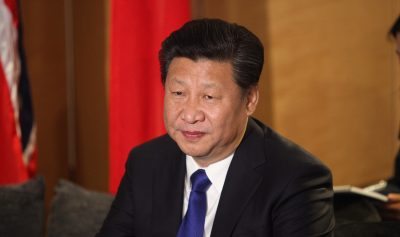Xi Jinping Is Right About the U.S. Empire

All Global Research articles can be read in 51 languages by activating the Translate Website button below the author’s name.
To receive Global Research’s Daily Newsletter (selected articles), click here.
Click the share button above to email/forward this article to your friends and colleagues. Follow us on Instagram and Twitter and subscribe to our Telegram Channel. Feel free to repost and share widely Global Research articles.
***
On the eve of Chinese President Xi Jinping’s current visit to the United States, the New York Times published an article detailing some of Xi’s thoughts about the United States.
The article states:
In Mr. Xi’s telling, China sought to rise peacefully, but Western powers would not accept the idea that a Communist-led China was catching up and could someday overtake them in global primacy. The West would never stop trying to derail China’s ascent and topple its Communist Party, he said in speeches to the military that are largely unreported by the media.
In 2015, Xi told military commanders:
“Some Western countries absolutely never want to see a socialist China grow strong under the leadership of the Chinese Communist Party.”
The Times writes that Xi’s speeches “voiced an almost fatalistic conviction … that China’s rise would prompt a backlash from Western rivals seeking to maintain their dominance.” Xi told Chinese Air Force officers in 2014, “The faster we develop, the bigger the external shock will be, and the greater the strategic blowback.” According to the Times,
“In Mr. Xi’s worldview, the West has sought to subvert the Chinese Communist Party’s power at home and contain the country’s influence abroad.”
The problem, one that all too many Americans are loathe to confront, is that Xi Jinping is right about the U.S. Empire.
Throughout history, empires have loathed rivals, opponents, adversaries, and competitors. They do everything they can to prevent them from rising, including the imposition of harmful economic measures but even going so far as to initiate wars against them, all with the aim of weakening what they perceive as a rising rival to their empire.
Of course, such measures inevitably also damage the people living in the empire, but the idea is that the empire, because it is already economically stronger, can withstand the economic deprivation better than the targeted nation, which ordinarily has a lower standard of living.
For decades after the Communist Party took control over China, the Party established and maintained a strict socialist system, one in which the government owned and controlled most everything. The result was massive poverty across the land, which, of course, meant a Chinese communist government with relatively few resources.
Then a few decades ago, China began liberalizing its economy, permitting the Chinese people to engage in economic enterprise, engage in trade, open businesses, and accumulate large amounts of wealth. The result was a tremendous increase in economic prosperity.
For a time, Americans celebrated this economic phenomenon. And why not? For decades, many Americans had criticized China’s socialist system precisely because it generated so much poverty among the Chinese people. Now the standard of living of people was soaring. Why wouldn’t everyone celebrate the fact that people in other parts of the world are escaping poverty?
Moreover, the rising prosperity in China meant that the Chinese people were increasingly able to purchase goods and services from Americans. The resulting trade made everyone better off.
But the U.S. Empire — specifically, the Pentagon, the CIA, and the NSA — saw trouble in all this. That’s because China’s economic prosperity meant vast new tax revenues for the Chinese communist regime — resources that enabled the regime to increase the size of its military and also to increase its influence around the world.
During the 20 years that the U.S. government was waging war against the people of Afghanistan and Iraq, China had no such burden. Rather than using its tax revenues to kill large numbers of people, as the U.S. Empire was doing, China was using them to expand its influence around the world by helping countries with big, grandiose socialist projects.
Thus, in the eyes of the U.S. national-security establishment, China’s rise posed a grave threat to its post-Cold War role as the world’s sole remaining empire. Something had to be done to bring China down, even if it harmed the American people at the same time. By suppressing China’s economic prosperity, the empire aimed to diminish the amount of tax revenues flowing into the Chinese government’s coffers, thereby limiting its ability to expand its military and its influence around the world.
It’s just the way empires have always worked. Questions naturally arises though for the American people: Is it right for the U.S. government to be wreaking economic damage on the people of another country? Indeed, is it right for the U.S. government to even be an empire?
*
Note to readers: Please click the share button above. Follow us on Instagram and Twitter and subscribe to our Telegram Channel. Feel free to repost and share widely Global Research articles.
Jacob G. Hornberger is founder and president of The Future of Freedom Foundation. He was born and raised in Laredo, Texas, and received his B.A. in economics from Virginia Military Institute and his law degree from the University of Texas. He was a trial attorney for twelve years in Texas. He also was an adjunct professor at the University of Dallas, where he taught law and economics. In 1987, Mr. Hornberger left the practice of law to become director of programs at the Foundation for Economic Education. He has advanced freedom and free markets on talk-radio stations all across the country as well as on Fox News’ Neil Cavuto and Greta van Susteren shows and he appeared as a regular commentator on Judge Andrew Napolitano’s show Freedom Watch. View these interviews at LewRockwell.com and from Full Context. Send him email.
Featured image: China’s president Xi Jinping in London, 2015. (Photo: FCDO / Flickr)

